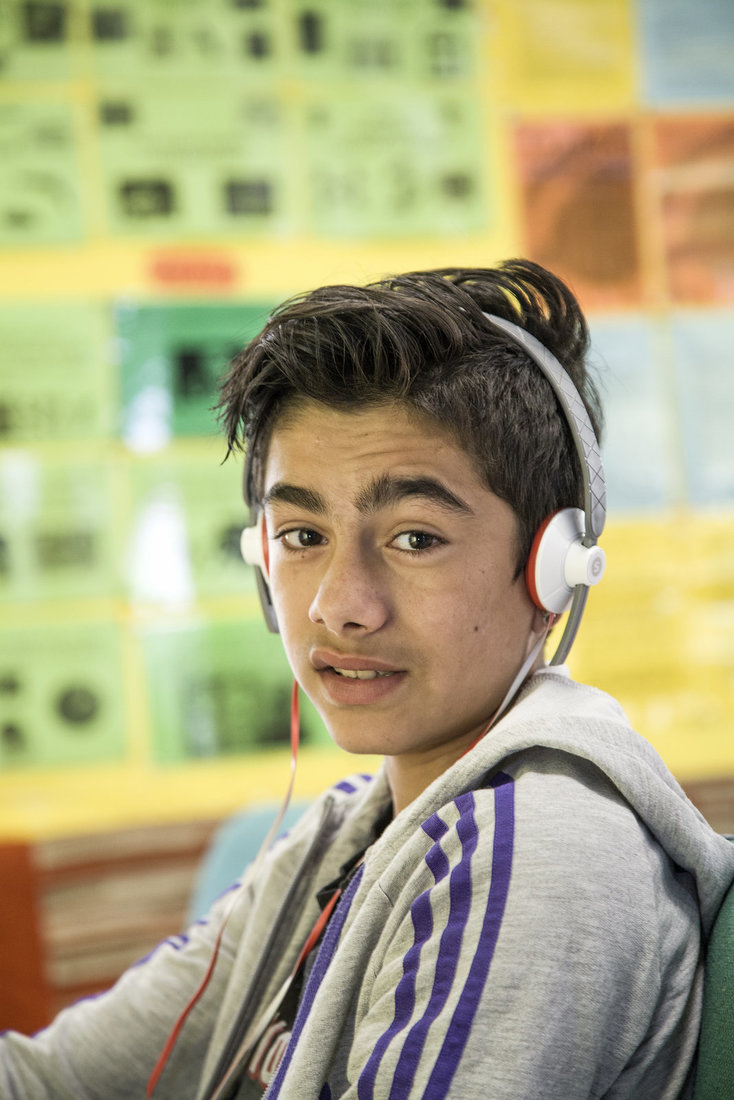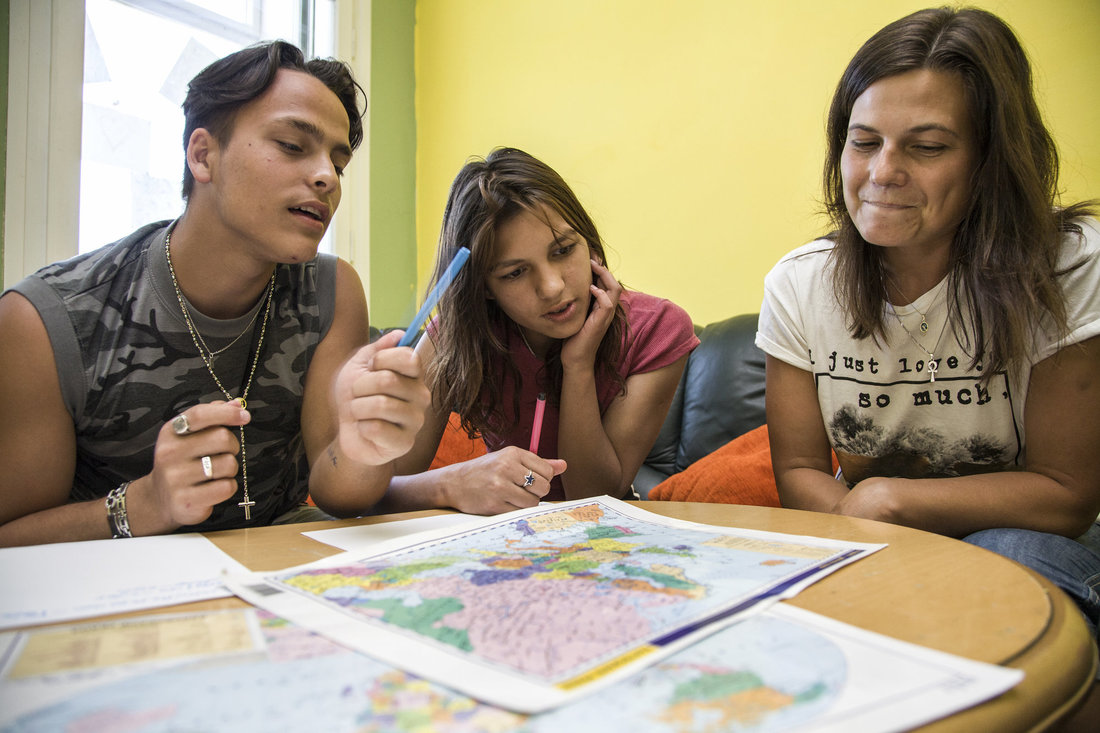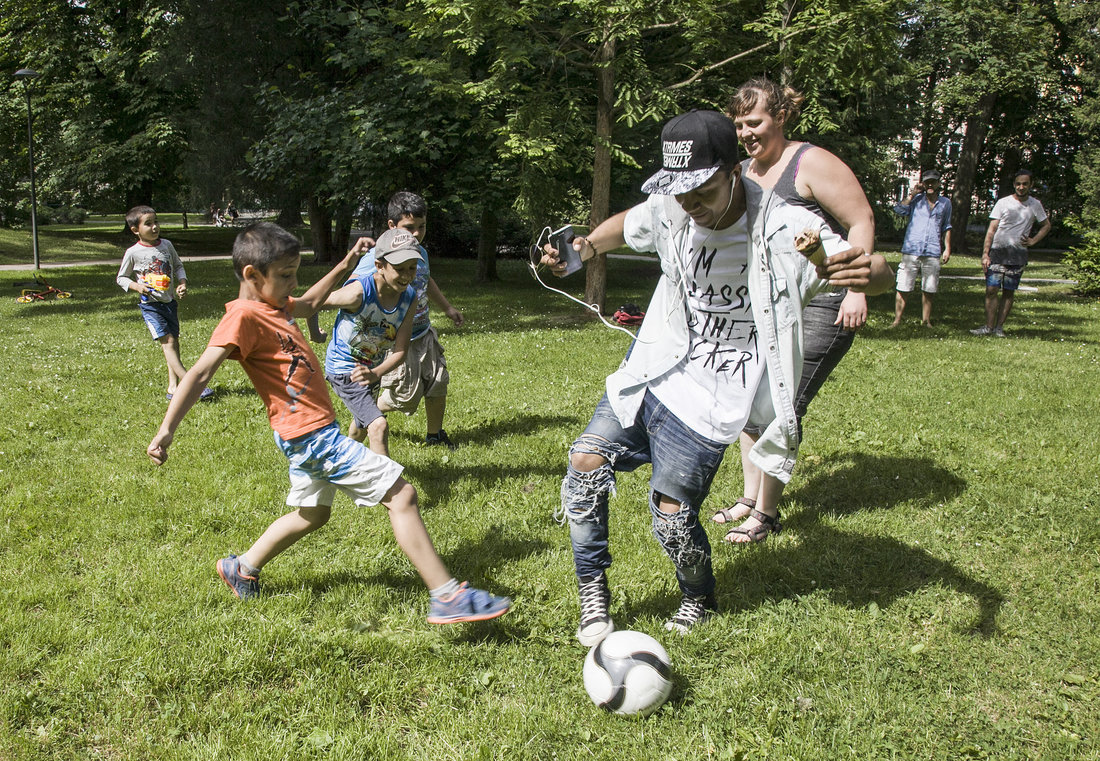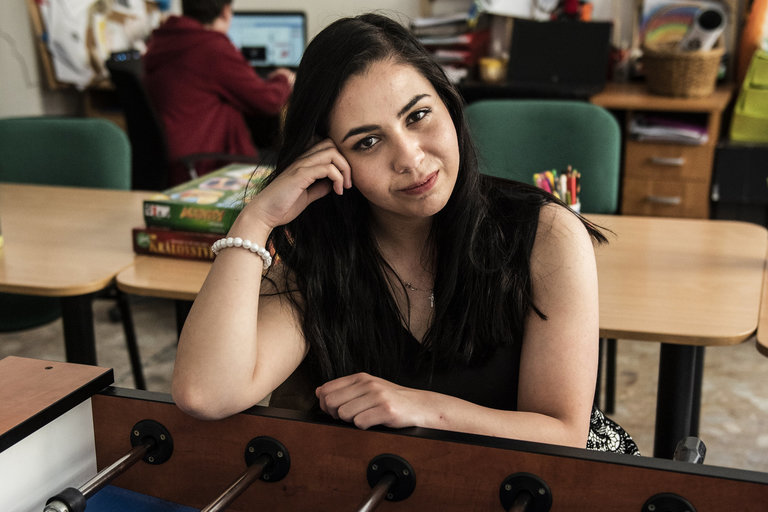Roma People Among Us. The Story of a High School Girl
There’s a shy knock on the door. Then it suddenly flies open and two little girls come charging into the room. They immediately get hold of Andrea and start begging: “Andy, shall we play sugar – coffee?” Andrea Bendíková hugs them and answers: “Okay, but when we’re done with the tutoring, alright?” The girls agree.
We are in the low-threshold club of the ECCB’s Diaconia called “Roundabout” in Jablonec nad Nisou. Eighteen-year-old Andrea has been giving children catch-up lessons for several years now. She teaches Maths, Czech, English and other subjects, when the kids are interested. Next year, she will be graduating from an economics high school, where she has made very good progress.
Her future looked completely different when she was six years old. According to the decision of a pedagogical-psychological advisory centre back at the time, she was not capable of attending a regular school and needed special education – because she was a Roma girl.
Hip-hop helps
It is difficult to guess all the factors that could have led the workers of the advisory centre to make such a decision. Andrea had problems with her kidneys as a little child and she was fighting a meningococcal disease. She used to be timid and nervous, which certainly wouldn’t have been a plus when meeting the pedagogues. However, her mother was determined not to give up.
 Andrea has two older brothers, both of whom had attended and successfully finished a regular elementary and middle school. Andrea’s mom argued that since both her sons had managed, she did not see a reason why her daughter could not. She did not give in until she got what she wanted. Andrea remembers that her parents stopped sending her to kindergarten, since it was mostly attended by Roma children. Perhaps they were trying to rid her of the stigma of a child that was impossible to educate.
Andrea has two older brothers, both of whom had attended and successfully finished a regular elementary and middle school. Andrea’s mom argued that since both her sons had managed, she did not see a reason why her daughter could not. She did not give in until she got what she wanted. Andrea remembers that her parents stopped sending her to kindergarten, since it was mostly attended by Roma children. Perhaps they were trying to rid her of the stigma of a child that was impossible to educate.
The beginnings were tough for Andrea at elementary school. Her progress was good, but she remembers the bullying. She would be bullied by both white and Roma classmates: she was a bit chubby, she had good grades, pocket money from her parents, praise from the teachers. She still feels bad when looking back on those days. Andrea sought comfort in dancing. She started attending hip-hop classes when she was six years old. The style is close to gymnastics and acrobatics; the dancing helped her get through this difficult period of her life.
High school, or an economics high school?
Later, it was actually Diaconia’s low-threshold club that helped. It is located in Jablonec nad Nisou, next to a roundabout (hence the club’s name). Andrea’s mom had read about it in the newspaper and suggested that her daughter come and see it. Andrea didn’t feel like it at first, but curiosity got the better of her. She had always got along well with older people and she felt she could share her worries with the workers at the club, or even go on a trip with them. She had never had such an opportunity at home, since her parents were spending the vast majority of their time at work. Her father worked in a foundry, her mother assembled crystal chains for costly lamps at the Preciosa company in Jablonec.
The environment at the low-threshold club, and the care and attention she received from its workers, helped Andrea develop a better relationship with her classmates and supported her in continuing her studies. Andrea’s parents wanted at least one of their children to graduate from high school – either a general one, or one with a focus on economics. Andrea preferred a more specific type of education, so she could get a job right after graduating, but she was afraid of the economics high school. She imagined her classmates would all come from well-situated families and they would not accept her as a Roma girl with working-class parents. The employees of the low-threshold club encouraged her to follow her preferences and even helped her prepare for the entrance exams.
workers, helped Andrea develop a better relationship with her classmates and supported her in continuing her studies. Andrea’s parents wanted at least one of their children to graduate from high school – either a general one, or one with a focus on economics. Andrea preferred a more specific type of education, so she could get a job right after graduating, but she was afraid of the economics high school. She imagined her classmates would all come from well-situated families and they would not accept her as a Roma girl with working-class parents. The employees of the low-threshold club encouraged her to follow her preferences and even helped her prepare for the entrance exams.
Attractive white world
She still remembers the tough beginnings. In September, just after the start of the school year, she was walking down the street with a new classmate and a group of Roma children passed by them. “I hate these Gypsies,” Andrea’s classmate remarked without a moment’s thought. Andrea looked at her in disbelief. It took her a while to realise that she was not a Roma girl to her classmate. She had black hair and dark skin, but that was not what made the difference. She attended an economics high school, which “does not happen to Gypsies”. It was a difficult month for Andrea. She knew that a get-to-know-you trip was about to take place in October. What would she tell her classmates? Would it be easier not to speak out about her ethnicity?
She was praying to the Lord and consulting the workers of the club. When the situation came at the trip, she introduced herself as a Roma and told her classmates she was not ashamed of it and would not let anybody insult her. She was a human being first and above all and asked her classmates to treat her accordingly. The decision to speak out turned out to be good. The class teacher supported Andrea and appreciated her courage. The classmates went along with this.
After some time, however, Andrea started to adapt herself to her classmates, which was not altogether good. She looked with amazement and a little envy at what the world of wealthy white families looked like. She noticed the parents take their kids to seaside holidays and praise them for their successes, which is not usual among Roma people. Roma families stand together, help each other in times of need, even if this requires some sacrifice, they are good at celebrating together (although some claim there were better times). However, when Andrea proudly tells her mom she made it to the world championship in hip-hop dance, her mother coldly remarks this will only mean another expenditure for the family. Andrea never went on a family holiday, despite the fact that no major circumstances stood in her parents’ way.
 Andrea began to withdraw herself from the world of the Roma people. When she was walking down the street and ran into an acquaintance, she would look away so she wouldn’t have to say hello. In the end, one of the workers of the low-threshold club had a talk with Andrea, which helped her see this was not a wise change in her behaviour.
Andrea began to withdraw herself from the world of the Roma people. When she was walking down the street and ran into an acquaintance, she would look away so she wouldn’t have to say hello. In the end, one of the workers of the low-threshold club had a talk with Andrea, which helped her see this was not a wise change in her behaviour.
The story of Andrea’s life would not be complete without mentioning her faith in God, which plays a crucial role in her life. When her little cousin was dying, her uncle and aunt met with a Roma pastor from Moravia, who started telling them about God. The little girl died, but Andrea and her aunt and uncle kept their faith. Andrea would spend weekends with them, they would pray together, read the Bible and talk. “Since that time, I am persuaded that a Roma family needs God. Without God, there is nothing,” she says.
And where does Andrea see herself in the future? If she continues studying after graduation, she will either choose pedagogy or languages. “Perhaps I’ll end up working for the Diaconia. I have a feeling this is my destiny,” she says, laughing.
